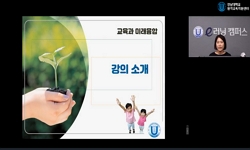This study critically examines the limitations of current technology-centered AI education in light of the socio-cultural transformations driven by the rapid spread of generative artificial intelligence and digital transformation. In response to these...
http://chineseinput.net/에서 pinyin(병음)방식으로 중국어를 변환할 수 있습니다.
변환된 중국어를 복사하여 사용하시면 됩니다.
- 中文 을 입력하시려면 zhongwen을 입력하시고 space를누르시면됩니다.
- 北京 을 입력하시려면 beijing을 입력하시고 space를 누르시면 됩니다.

AI_인문사회 기반 ‘융합형 AI 인재양성’ —사회문화 변화에 대응한 학제 간 융합 전략 = Developing Humanities-Based Convergent AI Talent: Interdisciplinary Strategies for Socio-Cultural Transformation in the Age of AI
한글로보기https://www.riss.kr/link?id=A109791042
- 저자
- 발행기관
- 학술지명
- 권호사항
-
발행연도
2025
-
작성언어
Korean
- 주제어
-
등재정보
KCI등재
-
자료형태
학술저널
-
수록면
343-365(23쪽)
- 제공처
-
0
상세조회 -
0
다운로드
부가정보
다국어 초록 (Multilingual Abstract)
This study critically examines the limitations of current technology-centered AI education in light of the socio-cultural transformations driven by the rapid spread of generative artificial intelligence and digital transformation. In response to these changes, the study proposes an alternative model of AI education that emphasizes the integration of the humanities and social sciences. By focusing on the formation of convergent AI talent, the research highlights the necessity of incorporating emotional, ethical, and contextual understanding into AI education. The study takes a closer look at the Gwangju AI Academy as a case study, analyzing its interdisciplinary education model, program outcomes, and alignment with regional policy frameworks. It emphasizes the importance of regionally grounded, community-based AI education as a sustainable approach to building a lifelong learning ecosystem. The findings suggest that AI education must go beyond technical skill development and include critical thinking, cultural competence, and ethical literacy. Through a humanities and social sciences-based AI curriculum, it is possible to cultivate well-rounded, socially responsible AI professionals. Ultimately, this study contributes to shaping a more inclusive and context-aware model of AI talent development.
동일학술지(권/호) 다른 논문
-
항공사 사고 특성별 서비스 회복 전략의 비교 연구-사례 분석을 중심으로-
- 조선대학교 국제문화연구원
- 서리
- 2025
- KCI등재
-
- 조선대학교 국제문화연구원
- 이건근
- 2025
- KCI등재
-
시니어 여성의 자기관리 역량 강화를 위한 메이크업 학습모듈 개발–NCS 기반 설계–
- 조선대학교 국제문화연구원
- 박혜선
- 2025
- KCI등재
-
『표준 한국어 의사소통』 고학년 교재의 주제 구성과 문화 활동 재구성 연구
- 조선대학교 국제문화연구원
- 최정희
- 2025
- KCI등재




 스콜라
스콜라


